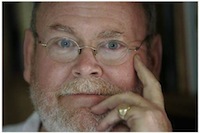Thomas Lynch Explores The Human Condition in New Book
 Sex and death, the Irish poet Yeats said, are the only things that can interest a serious mind.
Sex and death, the Irish poet Yeats said, are the only things that can interest a serious mind.
And Thomas Lynch has a serious mind.
The proprietor of Lynch & Sons Funeral Home in Milford since 1974, Lynch is likely the most recognized undertaker in the English-speaking world thanks to his part-time job as an internationally renowned writer and poet.
The Birmingham native and Brother Rice High School graduate has written three books of poetry, a memoir of his travels to his ancestral home in Ireland and two collections of essays, including “The Undertaking: Life Studies from the Dismal Trade” (1997), which won an American Book Award and was a finalist for the National Book Award.
His eloquent thoughts on death and its rituals have led to appearances on MSNBC, “Today” and a PBS series with Bill Moyers. His commentaries have been broadcast by NPR, BBC Radio and RTE in Ireland, and his writings have appeared in the New York Times, New Yorker magazine and the Paris Review.
Now the 61-year-old is bringing his talents to bear on fiction.
“Apparition and Late Fictions,” a collection of four short stories and a novella, was released nationally last week. Lynch will launch the book locally at 7 p.m. Tuesday with a reading at the Milford Township Library.
Following the dictum “write what you know,” Lynch’s stories are populated by cremationists, casket salesmen and clergy. Death and the ways in which the living respond to it are recurring themes. And the northern Michigan wilderness is often a central character.
Though Lynch’s experiences as a funeral director inform the stories, the real subject matter is the human condition.
“Of course, many reviewers assume that because I’m the undertaker that the stories are about death and mortality,” he says. “I think they are more about pilgrimage — each character trying to make his or her way in the world as he or she apprehends it.”
In the opening short story, “Catch and Release,” a grieving fly-fishing guide takes the ashes of his father fishing one last time on the Pere Marquette River and confronts an eternal human dilemma: how to hold close the departed while at the same time letting them go.
In “Bloodsport,” a young wife is shot and killed by her husband in the Michigan woods. The small-town embalmer who narrates the story allows Lynch to bring the reader face-to-face with the grim, physical realities of tending to the dead and examine the mysterious places where longing, love and grief intersect.
“Hunter’s Moon” tells of a casket salesman who has lost three wives — two to divorce, one to cancer — as well as his teenage daughter, who was hit by a train. Now retired to a lake home Up North, he looks back on his life with a growing sense of his own mortality.
Lynch says that the fourth short story, “Matinee de Septembre, “is based on a structure that I stole from Thomas Mann’s ‘A Death in Venice.’ ” In Lynch’s version, a female academic and poet from Ann Arbor is smitten by a beautiful Jamaican girl she encounters at Mackinac Island’s Grand Hotel.
The novella, “Apparition,” follows a lapsed Methodist minister-turned-self-help author whose book, “Good Riddance — Divorcing for Keeps,” makes him an overnight commercial success.
“It’s a story about grace,” says Lynch. The protagonist’s “fall from favor with his ex-wife and church and the life he thought he had a hold of is the occasion for his renewed faith in God’s gifts.”
Lynch’s first foray into fiction reinforces what readers of his earlier work already know: He writes with a poetic precision and beauty capable of inspiring sheer joy.
He wrote “Bloodsport” nearly 10 years ago. When it was selected for the anthology “Best American Mystery Stories 2001,” he thought, “Well, that one holds up OK, so at least I can go ahead.”
Lynch is now working on a novel.
One difference between writing poetry and fiction, says Lynch, is that “poets are sort of self-taskers. Nobody says to them, ‘I want that sonnet tomorrow.’ As a poet you’re constantly setting your own bars, jumping over them and saying, ‘See I told you so.’
“Whereas with fiction, people do actually have an appetite for it. People do like a good story.”
And Lynch leaves no doubt as to what will guide his writing.
“Yeats was exactly right,” he says. “Sex and death are it. That’s the story. That’s what we humans do. We procreate and we disappear. Those are the bookends for me. What got us here, and what gets us out.”
Contact freelance writer CHRISTOPHER WALTON at chriswalton14@hotmail.com.
Source: FreeP.com
Photo By: ALAN BETSON




